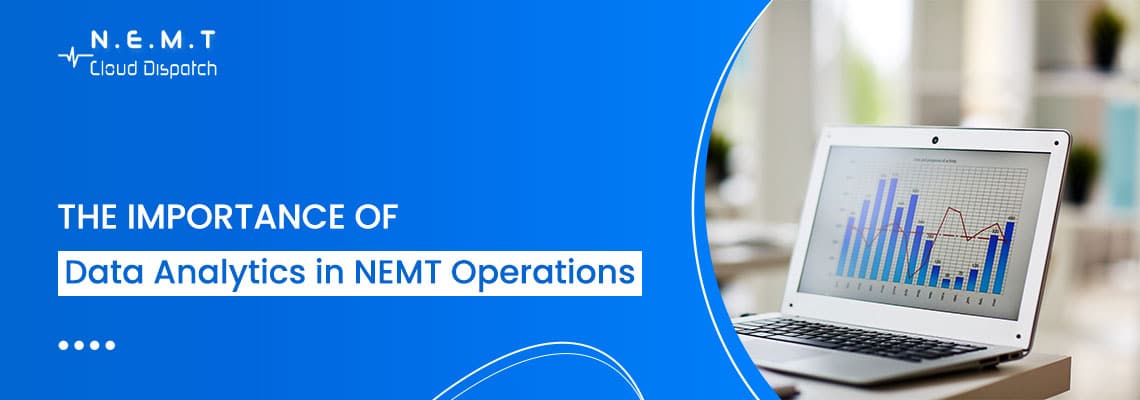Non-emergency medical transportation (NEMT) is a critical component of the healthcare system, providing transportation services for individuals who cannot drive themselves to medical appointments due to age, disability, or financial constraints. Understanding the importance of data analytics in NEMT operations is essential, as it helps improve efficiency, reliability, and the ability to meet the diverse needs of patients. By leveraging data insights, NEMT providers can optimize routes, enhance service quality, and better manage resources.
In this context, data analytics emerges as a powerful tool that can transform NEMT services by optimizing operations, improving patient outcomes, and reducing costs.
Key Data Types for Analysis in NEMT Services
Data analytics in NEMT operations involves the collection and analysis of various types of data. Each type provides unique insights that can be leveraged to enhance service delivery.
Trip Data
Trip data includes details about each journey, such as the pick-up and drop-off locations, travel time, distance, and the time spent waiting. Analyzing trip data helps in understanding patterns related to demand and supply, identifying peak times, and planning efficient routes.
Patient Data
Patient data encompasses information about the individuals using NEMT services, such as their medical conditions, special requirements, frequency of trips, and preferred pick-up and drop-off times. This data is crucial for personalizing services and ensuring that patients’ specific needs are met.
Vehicle Data
Vehicle data includes information about the fleet, such as vehicle type, fuel consumption, maintenance schedules, and availability. Analyzing this data helps in optimizing fleet management, reducing downtime, and ensuring that the right vehicles are assigned to the right tasks.
Driver Data
Driver data involves details about the drivers, including their schedules, driving records, certifications, and customer feedback. This data is essential for monitoring driver performance, ensuring compliance with regulations, and maintaining high service standards.
Financial Data
Financial data includes cost-related information, such as fuel expenses, maintenance costs, driver wages, and operational costs. Analyzing financial data helps in identifying cost-saving opportunities and improving the overall financial health of NEMT operations.
Advantages of Implementing Data Analytics in NEMT
The application of data analytics in NEMT operations offers numerous benefits, each contributing to the overall effectiveness and efficiency of the services provided.
Improved Operational Efficiency
Data analytics can significantly enhance operational efficiency by optimizing route planning and scheduling. By analyzing trip data, NEMT providers can identify the most efficient routes, reduce travel time, and minimize fuel consumption. This not only lowers operational costs but also ensures timely pick-ups and drop-offs.
Enhanced Patient Experience
With insights from patient data, NEMT providers can tailor services to meet the specific needs of each patient. This personalization improves patient satisfaction and ensures that individuals receive the care they need when they need it. For example, patients with mobility issues can be assigned vehicles equipped with wheelchair lifts, while those requiring frequent visits can be given priority scheduling.
Better Fleet Management
Analyzing vehicle data helps in effective fleet management by identifying the best times for maintenance, predicting potential breakdowns, and ensuring that the fleet is utilized optimally. This proactive approach reduces downtime and extends the lifespan of vehicles, ultimately saving costs and improving service reliability.
Driver Productivity and Satisfaction
Driver data analysis allows NEMT providers to monitor performance, identify training needs, and recognize top performers. This leads to a more motivated and efficient workforce. Additionally, by optimizing driver schedules, NEMT providers can reduce driver fatigue and improve job satisfaction.
Cost Reduction
Financial data analysis provides a clear picture of where money is being spent and identifies areas where costs can be cut without compromising service quality. For instance, by analyzing fuel consumption patterns, NEMT providers can adopt more fuel-efficient practices, and by reviewing maintenance costs, they can make informed decisions about vehicle replacement.
Regulatory Compliance and Risk Management
NEMT operations must comply with various regulations related to safety, patient privacy, and service quality. Data analytics helps in monitoring compliance by tracking relevant metrics and generating reports. This proactive approach to compliance reduces the risk of legal issues and enhances the reputation of the NEMT provider.
Conclusion
The integration of data analytics into NEMT operations is not just a technological upgrade; it is a strategic imperative that can drive significant improvements in service quality, operational efficiency, and financial performance. In a field where timely and dependable transportation can directly impact health outcomes, the role of data analytics cannot be overstated. As NEMT providers continue to adopt and refine their data analytics capabilities, the ultimate beneficiaries will be the patients who rely on these essential services to access healthcare.


